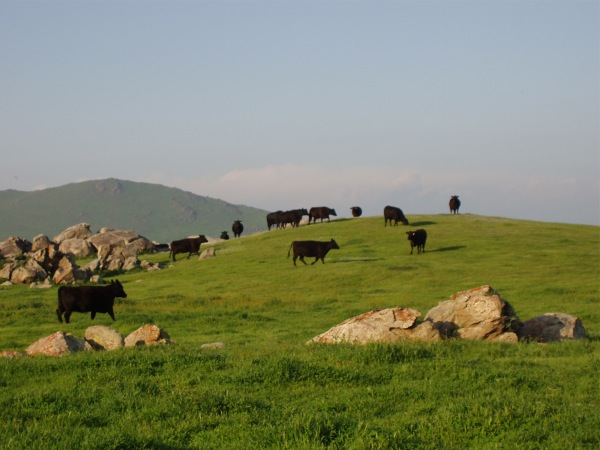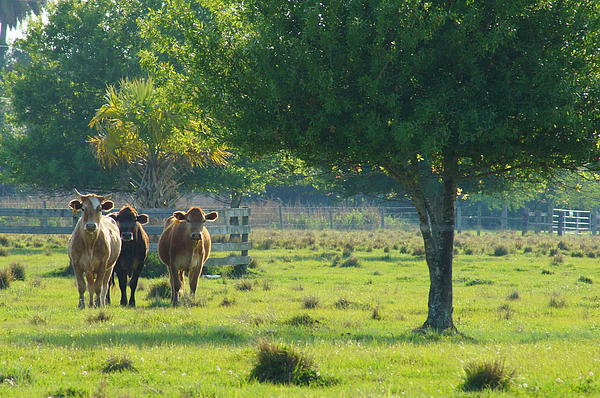I have been tracking my blog traffic more closely lately and I've noticed that my "diary" entries are some of my most popular posts!
This month, I am going to discuss one of the foods that I am most passionate and concerned with.
BEEF! Unlike many dietitians, I am
OK, let's see if I can articulate my opinion.
The beef industry is controlled by a small handful of huge corporations that control 80% of beef processing. Just like any corporation, the main goal is MONEY.
How do they make more money? By processing as much beef as possible, as quickly as possibly. Just like humans, cows fatten up fastest when they don't move around much and they eat a lot. Fattening up the cows is done by putting cows in feedlots before they are "processed." (I'm going to use the term processed, instead of slaughtered to make myself feel better.) Most cattle start their lives on a family farm, but are sent to a feedlot to gain weight faster, to be "processed" sooner. When cows are put in feedlots, they are in very close quarters, with no grass, lots of poo and are fed grain (primarily corn). All of this cow-poo and filth equates to the release of methane gases into the environment, which are often blamed for ozone depleted and serious pollution.
Regardless of pollution, when you put a bunch of living creatures in close quarters, what usually happens? They get sick. In order to prevent this, cattle are given plenty of antibiotics and other drugs, in fact, the meat industry uses about 75% of the antibiotics in the U.S.! But as we all know, medicine can't solve all problems and there is inevitable illness. Although the USDA has strict food safety practices, beef can be contaminated, as history has shown. The most commonly contaminated meat is ground meat, not only because it is more exposed, but it often contains meat from multiple animals. Unless you have your meat ground at the butcher, it would be hard to guarantee that it was only from one animal and even harder to guarantee that all those animal were healthy. In short, if you wanted to know where your pound of ground beef came from, it possibly came from Colorado, Texas, California, Arkansas, Washington, Oklahoma, Nebraska, etc.......all in one pack of meat. But it's more economical for the beef industry to process these animals all together, in one huge plant. It makes them more money. YIKES.
Food safety, however is not my main concern with the beef industry. When cattle are fed grain (corn-based), they fatten up quickly, but it's not natural or normal for cows to eat corn. Cows Eat Grass! It is as simple as that! Sure in their free range days, they may have ran across the occasional stock of corn, but it definitely wasn't a staple in their diet. Now they are fed corn because it creates a product that makes the Beef Industry more money faster! It also ruins the nutritional quality of the meat, promotes GMO crops, and is primarily fed in feedlots.
Let's compare the nutritional quality of grain fed vs grass fed beef. Grass fed meat is:
- Lower in fat, therefore, lower in calories (one study I read said by simply switching to grass-fed meat, the average American would lose 6 pounds in a year!)
- Higher in Omega-3 fatty acids (heart healthy fats), 2-4x as much as grain fed.
- It's higher in antioxidants, like vitamin E and A
Not only is grass-fed beef nutritionally superior, but it promotes a healthier environment for humans and cattle! It's truly a win-win situation, unless you are the beef industry, of course. Grass fed cattle are on pasture or free range, allowing them to move around and breathe the fresh air, these two things alone could help prevent illness, therefore use less medicine. Secondly, since they are moving, they can poop where ever they want to, instead of piling it up in the close quarters of a feedlot. When they poop all over God's green earth (instead of in one spot), it is naturally composted back into the soil and doesn't release a fraction of the gases produced in a feedlot.
Ok, so far grass fed meat equals:
- Better nutrition for us
- Less antibiotics and other pharmaceuticals for everyone
- Less illness for cows
- Less pollution for Mother Earth
Now why in the world aren't we switching over to grassfed meat? Well it's because the beef market is controlled by a handful of very rich corporations that want to make more money. They don't want anyone else processing beef, so they make it practically impossible for the small-town butcher to commercially and legally sell meat. So if you can find it, it's usually very expensive. Most cattle ranchers have one choice and that's to send their cattle to a feedlot. In general, small, independent slaughterhouses are safer and more direct.
Grassfed beef could also benefit:
- The rancher
- The small businesses
- The consumer
- The community, creating jobs
So what's the solution? We need to take baby steps backward in time...back to a time when we either raised our own meat or bought it from our neighbors. We need to:
- Allow small businesses to process, resale and distribute homegrown, grass fed beef. This would be an alternative for ranchers sending their cattle to feedlots ran by the beef industry.
- Allow ranchers to free-range their cattle on public land. If you haven't been on a road-trip across America lately (I just drove from Savannah, GA --> Scottsdale, AZ), we have lots of land and grass that is just sitting there! We may as well put it to good use!
- Quit eating fast food, they are the #1 purchasers of cornfed, feedlot beef. They keep these the large, money-hungry beef corporations in business and in charge of your food supply.
- Quit buying beef from the grocery store! If at all possible, buy local/grassfed or at least have the grocery butcher grind your meat for you.
- Buy meat local and support local farms. The more you know about your food, the better. If you live in a city, consider buying in bulk from a farmer's market or local butcher shop. If you live in the country, buy beef from local ranchers and process it at a local butcher. You can even carefully shop online.
- Put MORE MONEY in the pockets of farmers and small businesses, not large corporations.
I know this plan is full of flaws, but if everyone did something little, like buy local, it could make a huge difference! I know there are many other view points on this subject, including becoming vegetarian, but that's just simply not an option for me! :) I think beef, especially local, grassfed beef, can be a part of every healthy diet and has many powerful nutritional qualities, including zinc, vitamin B12, iron and other vitamins/minerals. I believe in a diet full of variety and I personally LOVE beef, it's my favorite meat protein source.
Because of monopolizing corporations like the beef industry, there are nearly 5 million fewer farms in the U.S. than there was in the 1930's, with about 330 farmers leaving their land each week. Family farms are one of the most important things we can support as a culture. They keep green space in the community and produce healthy foods and other goods without the chemicals or filth of industrial farms. Start with buying meat local and work up to buying other things like produce, milk, and other items.
It took us 100 years to create the mess we are in with our food system, but with determination maybe we can reverse it in half the time! What do you think?





Here in Ellensburg, Washington, we are fortunate to have access to grass fed beef, whether from a neighbor, or a local rancher. I like EatWild.com for information and resources. Cornfed not only permeates our beef, but also dairy products and eggs. Thanks for such a succinct article!
ReplyDeleteTerri, If only we could all be so lucky as to live in The 'Burg! I like eatwild.com, too! Thanks for the feedback.
DeleteI knew I would eventually have a some negative comments, but I'm choosing to keep my site positive so I have deleted these comments. I Just want to reiterate my main concern of the beef industry: I am most concerned about the environment, our health, and the health of the animals....and the large corporations make compromise all three of these.
ReplyDelete